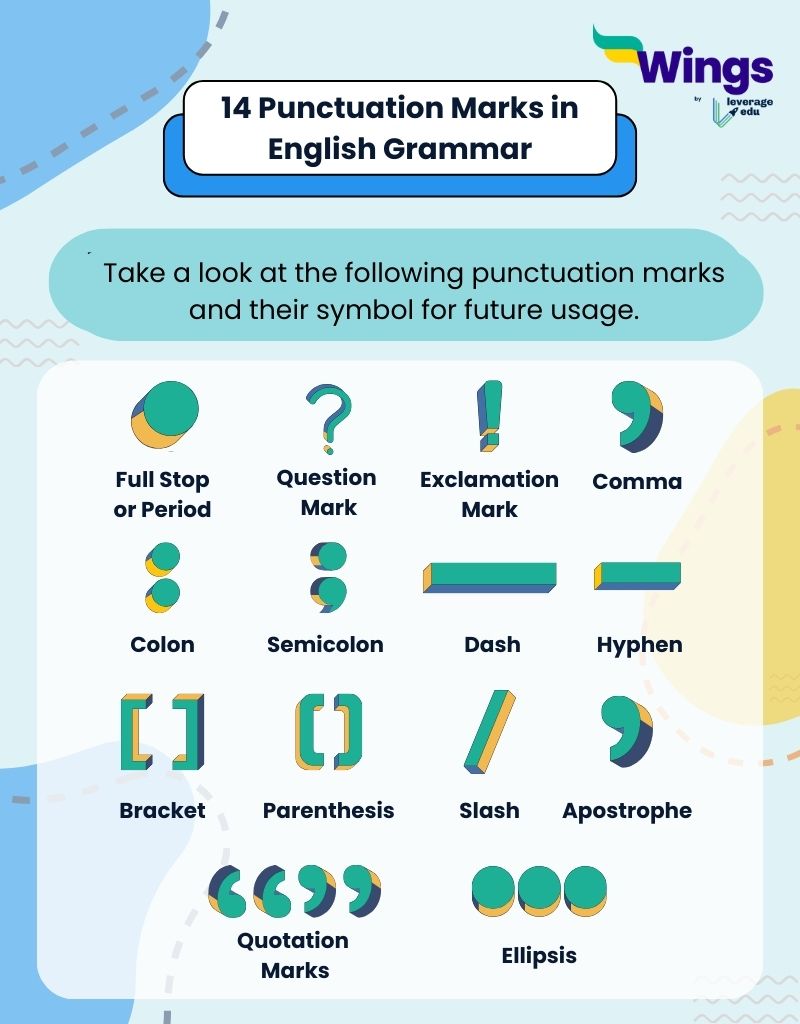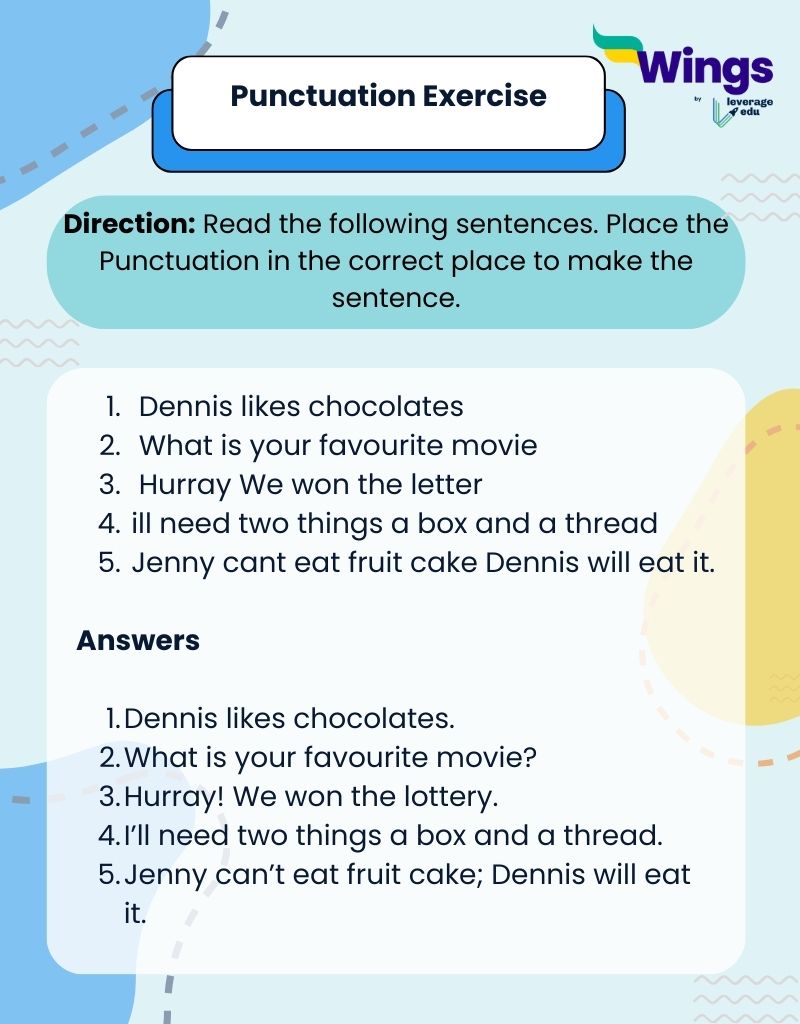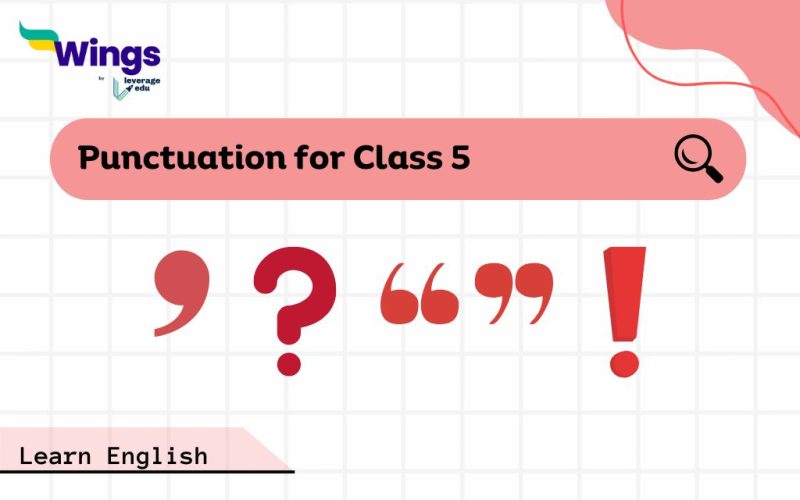Punctuation for Class 5: Punctuation Marks help the readers understand that certain actions are happening in the sentence. It indicates sudden pauses, endings, and something that has been asked in a sentence. Punctuation is an important symbol in English grammar that helps writers express the emotions that they want to convey in their writings. To know more about punctuations taught to grade 5 students, keep reading this blog.
This Blog Includes:
Types of Punctuation for Class 5 Students

Punctuation is an important chapter in the book for Class 5 students. They have to understand punctuation in a better way to improve it further, as they already have a basic idea of the topic from the previous classes. So, we have come up with all the punctuation marks taught to class 5 students.
Period( . )
A period or full stop is a type of punctuation mark that indicates that the sentence has come to an end and is usually put after the completion of the sentence. The Period is denoted by a small dot (.).
Examples:
- They were going to classes.
- The sun rises in the east.
- His dog’s name is Bruno.
- My name is Sam.
Explore: Punctuation Marks for Class 4 English Grammar
Capitalization
Capitalization mark is mainly used to indicate that the first letter of the sentence or the proper noun should be in capital letters. Several rules in English grammar show which words are to be capitalized and which are not. Let’s understand through the table the words that need to be capitalized.
| Words to be Capitalized | Words that are not Capitalized |
| Weekdays and Months – December, January, and Tuesday. | Season Names – winter and summer |
| Celestial Bodies – Venus, Neptune and Mars | Flower names – sunflower, marigold, and rose |
| Names of Countries, Rivers, and Mountains – China, France, Nile | Tree names – neem, deodar, and mango tree |
| Places, Holidays, and Festivals – Diwali, Christmas, New York |
Examples:
- John is playing football.
- They are currently on Christmas holidays.
- He is going to meet Mr. Adams in Paris.
- David is planning his vacation in June.
- The Yukon River is huge in Alaska.
Check Out: Punctuation for Class 1: Types, and Worksheet
Comma( , )
The comma is mainly used to organize and divide words in a sentence. It is placed in a sentence to show a small pause while speaking or reading. Let’s understand some of the examples of Comma along with their usage.
| Uses | Examples |
| Comma use in a list | The child has watercolor, a paintbrush, and a color plate for drawing. |
| For separating adjectives | That large, blue fish is coming out of the water. |
| Addressing someone directly | Hey Son, Are you preparing for the test? |
Also Read: What is the Use of Commas (,): Meaning, Rules, & Examples [with PDF]
Semicolon( ; )
A semicolon is a more powerful form of the comma that is used for creating connections between sentences that are closely related to each other.
| Uses | Examples |
| Connecting the closely related sentences | My favourite planets are Mars, which represents desire; Jupiter, which represents luck; and bright Venus. |
| Separating the list of items that contain commas | My favorite planets are Mars, which represents desire; Jupiter, which represents luck; and bright Venus. |
Also Read: 11+ Semicolon Examples and Tips to Use
Colon( : )
A colon is a type of punctuation mark that is used to emphasize or introduce an object in a sentence. It also tells that more amount of information is to be given. Take a look at the examples below to get an idea of how a colon can be used in a sentence.
| The professor gave us a challenge: to read a file and write a report on it. |
| There’s one thing I want for Christmas: a new Mobile Phone! |
Must Read: Colon Punctuation Examples with Uses in English Grammar
Apostrophe( ‘ )
An apostrophe is mainly used for showing missing letters during the combination of words and for possession. Check out the examples below to get an idea of the same.
| Usage | Examples |
| For indicating possession | This is Tim’s book. |
| In place of missing letters | They’re planning to visit her uncle. |
Related Read: How to Use Apostrophes? Learn 3 Golden Rules with Examples
Exclamation Mark ( ! )
An Exclamation Mark is a type of punctuation mark that is used to express strong emotions and feelings in a sentence. For example, in the sentence, I love chocolates! The exclamation mark(!) indicates the excitement of the person.
For Example:
| Wow! He is playing wonderful cricket shots. |
| Hurray! We have won the competition. |
| Yum! You have made delicious food. |
Read More: Punctuation for Class 2: Types, Examples, and Worksheets
Question Mark( ? )
A question Mark(?) is usually put at the end of the sentence and used to indicate that the question is asked. In the sentence “What are you doing?” The question mark symbols show that a question is asked.
For Example:
| What you have been doing since morning? |
| Why are you playing at night? |
| Are you going to the party? |
| Did you finish the leftover piece of cake? |
Also Reads:
| Question Mark Punctuation (?): Definition, Usage, and Examples | Question Mark Upside Down: Explained in Detail |
Worksheet on Punctuation for Class 5
Exercise 1: Choose the Correct Punctuation Mark
Fill in the blanks with the correct punctuation mark ( . , ? , ! , ‘ , ” “).
- What a beautiful dress __
- My cousins __ friends and I went to the fair.
- She said __ I love to read stories.
- I dont know where my notebook is __
- The cat drank all of its milk __
- Rahul asked __ When is the picnic
Answers:
- What a beautiful dress!
- My cousins, friends and I went to the fair.
- She said, “I love to read stories.“
- I don’t know where my notebook is.
- The cat drank all of its milk.
- Rahul asked, “When is the picnic?”
Exercise 2: Rewrite Using Capital Letters and Punctuation
Rewrite the following sentences with proper capitalization and punctuation.
- my sister and i went to the park on monday
- have you seen my new bicycle
- mr sharma is our principal
- sara john and michael are best friends
- i am reading a book called alice in wonderland
Answers:
- My sister and I went to the park on Monday.
- Have you seen my new bicycle?
- Mr. Sharma is our principal.
- Sara, John, and Michael are best friends.
- I am reading a book called Alice in Wonderland.
Punctuation Exercise: Download Free Worksheet

FAQs
They can learn by understanding the punctuation marks well in the classes and through books. Solve the exercises to learn Punctuation in a better way.
Period( . ) Punctuation marks have high importance as it is used for closing the sentence.
The comma is used to divide the independent clauses when they are joined by any coordinating conjunction such as but, and, or, for, nor, yet, so.
A colon (:) is mainly used for introducing details that are constructed by the last clause. It is normally used before an example, list, or explanation. However, a semicolon(;) is mainly used for joining the linked independent clauses combined in a similar sentence without using the conjunction.
Find more punctuation reads below!
This was all about the “Punctuations For Class 5: Types and Their Uses” and more in grammar. Hope you understand the concept and know how to proceed. You can also follow the Learn English page of Leverage Edu for more exciting and informative blogs.


 One app for all your study abroad needs
One app for all your study abroad needs












 60,000+ students trusted us with their dreams. Take the first step today!
60,000+ students trusted us with their dreams. Take the first step today!